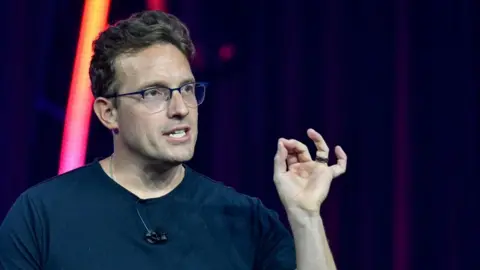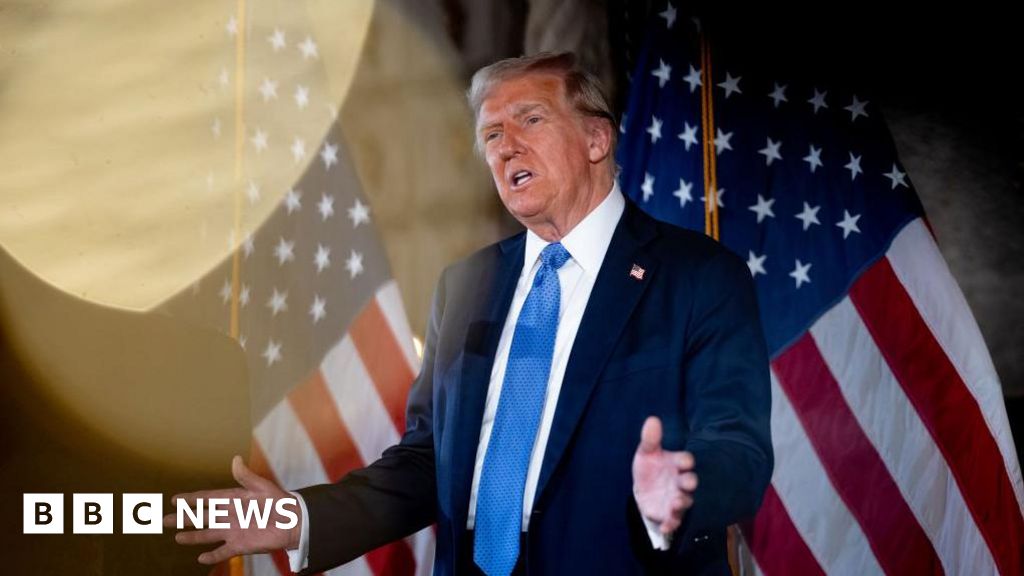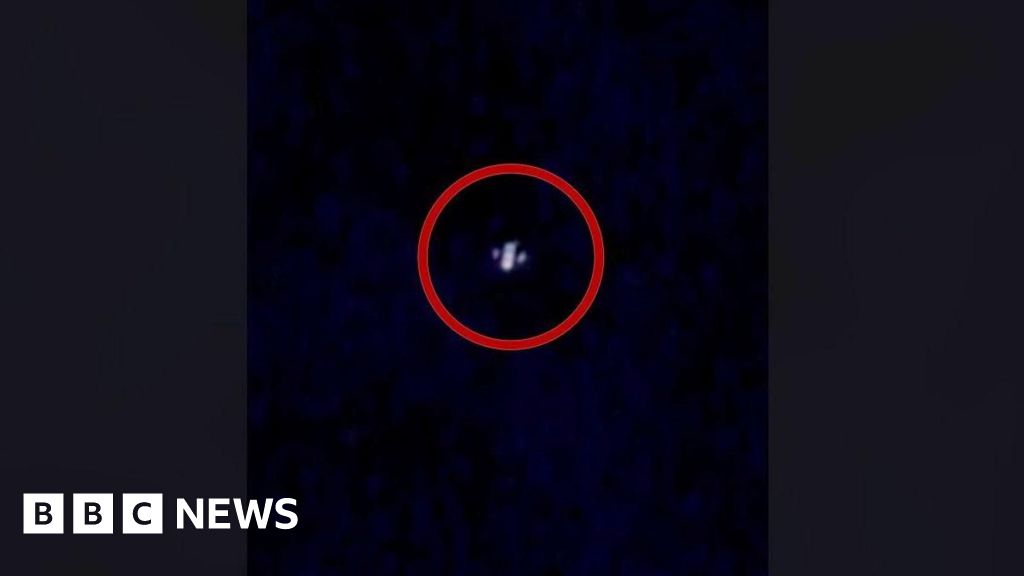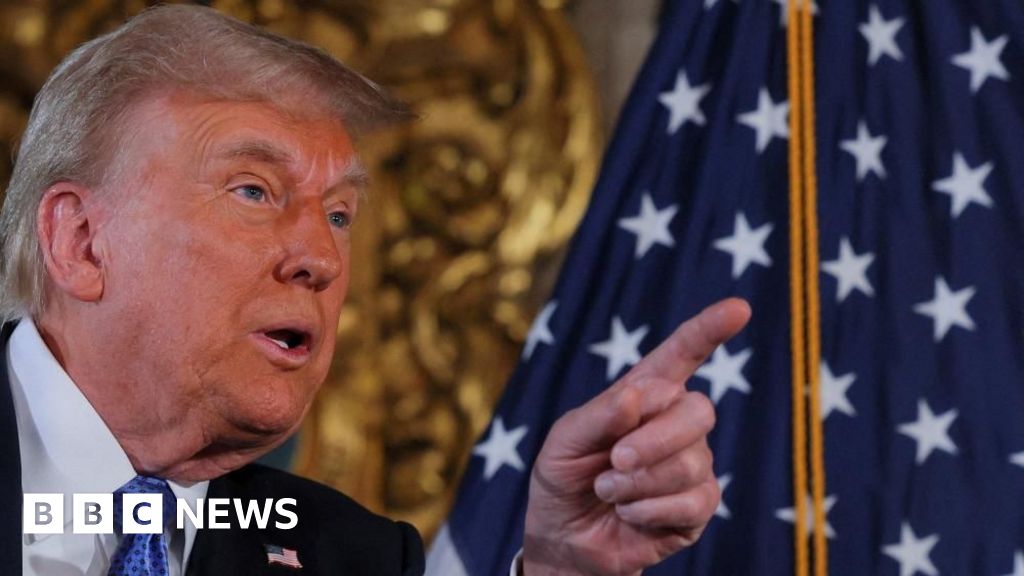ARTICLE AD BOX

 Getty Images
Getty Images
Benny Johnson, a conservative US commentator, says he was a victim if the allegations of the Russian plot prove true.
Conservative US influencers say if the allegations are proven, they were deceived by Russian media executives following the release of an indictment charging Moscow with interfering in the 2024 US election.
The indictment accuses state broadcaster RT, formerly Russia Today, of paying a Tennessee firm $10m (£7.6m) to "create and distribute content to US audiences with hidden Russian government messaging".
US media outlets identified the firm as Tenet Media, which describes itself as "network of heterodox commentators that focus on Western political and cultural issues".
Tenet Media, which was was not directly named in the indictment, was founded in 2022 by conservative Canadian YouTuber Lauren Chen and her husband Liam Donovan. Tenet has not commented publicly on the allegations and did not respond to a request for comment.
The network employs several well-known right-wing US influencers - such as Tim Pool, David Rubin and Benny Johnson - who say they are "victims" of the alleged plot if it is proven.
US officials characterised the US and Canada-based influencers that worked for Tenet as "unwitting" figures in the Russian scheme, which allegedly paid some commentators hundreds of thousands of dollars a month to make videos for the platform.
The indictment says that videos - which often promoted right-wing narratives on issues such as immigration, gender and the economy - were secretly "edited, posted, and directed" by two RT employees.
“While the views expressed in the videos are not uniform, the subject matter and content of the videos are often consistent with the Government of Russia’s interest in amplifying U.S. domestic divisions in order to weaken U.S. opposition to core Government of Russia interests, such as its ongoing war in Ukraine,” the indictment said.
Kostiantyn Kalashnikov and Elena Afanasyeva were identified in the indictment as the RT staffers. The justice department has charged them with conspiracy to commit money laundering and conspiracy to violate the Foreign Agents Registration Act.
In a response to a request for comment on the indictment, RT's press team said: "2016 called and it wants its clichés back".
The indictment says that Mr Klashnikov "monitored" the company's "funding, hiring and contract negotiations" with some of the commentators and Ms Afanasyeva was involved in the firm's editorial efforts.
It is said that the company's founders did find the ease they had in acquiring funding to be suspicious.
The platform's two founders "admitted to each other in their private communications that their 'investors' were, in truth and in fact, the 'Russians'", the indictment says.
Commentators say they were 'victims'
Several of the influencers said on social media that, if the allegations are true, they should be considered "victims" of the plot. They also insisted that they maintained full editorial control over their content.
Mr Pool, whose The Culture War Podcast was licensed by Tenet Media, told his 2.1 million followers on X/Twitter that if "these allegations prove true, I as well as the other personalities and commentators were deceived and are victims. I cannot speak for anyone else at the company as to what they do or to what they are instructed".
Mr Johnson, who has 2.7 million followers on X, said on Wednesday that he was “disturbed by the allegations in today’s indictment, which make clear that myself and other influencers were victims in this alleged scheme”.
He said that his company's lawyers had "negotiated a standard, arms length deal" after they were approached by the media startup. He said that agreement was later terminated.
Mr Rubin, who boasts 1.5 million followers on X, said his show on Tenet ended months ago, and that he had not been contacted by the justice department.
"I and other commentators were the victims of this scheme," he wrote concerning the allegations. "I knew absolutely nothing about any of this fraudulent activity."
The indictment says that the media company posted about 2,000 videos that received more than 16 million views on YouTube since the plot got underway.
“The company never disclosed to the influencers or to their millions of followers its ties to RT and the Russian government,” US Attorney General Merrick Garland said on Wednesday.
Two of Tenet Media's other contributors said on a livestream that they were never told what to say in their content.
“How am I unwittingly duped into saying someone else’s words when I wrote every one of them?” Matt Christiansen, a less prominent commentator, said.
How the Russians allegedly hired media influencers
The court document alleges that the commentators exacted a huge payout in negotiations, with three of the biggest stars getting paid $8.7m.
According to the indictment, the Russian scheme directed a founder of the media company to recruit two conservative influencers by offering them $2m a year.
The indictment says that one of the commentators responded that "it would need to be closer to 5 million yearly for him to be interested", and the other said "it would take 100k per weekly episode to make it worth his while".
The first influencer allegedly eventually agreed to make four videos per month for $400,000, and the other, according to the indictment, allegedly agreed to be paid $100,000 per video.
To close the negotiations, the Russians allegedly fabricated a Hungarian businessman named "Eduard Grigoriann" as a key investor. They went so far as to create a fake CV for the false identity, according to the court documents, and held phone calls with an agent posing as him.
The indictment cites multiple instances in which the platform's employees had their own suspicions about the arrangement they found themselves in.
Ms Afanasyeva is said to have shared a video to be posted made by a well-known political commentator visiting a grocery store in Russia. Media outlets have identified this alleged commentator as Tucker Carlson, a former Fox News star, who visited Russia to interview President Vladimir Putin.
He uses Russia's store prices to opine on US inflation and cost-of-living issues. There is no suggestion he was aware of the alleged plot.
According to the indictment, a producer privately messaged one of the company's founders complaining that "they want me to post this" but added that "it just feels like overt shilling".
The producer is said to have ultimately put the video out at the founder's direction.
At another point, Ms Afanasyeva allegedly directed one of the founders to get "one of our creators" to "record something about (the) Moscow terror attack" in an effort to link it to Ukraine and the United States, despite the Islamic State claiming responsibility.
The indictment suggests that the commentators ultimately fulfilled her requests, but Ms Afanasyeva is said to have grown annoyed multiple times when she did not think they were promoting the company's videos enough.

 3 months ago
16
3 months ago
16








 English (US) ·
English (US) ·